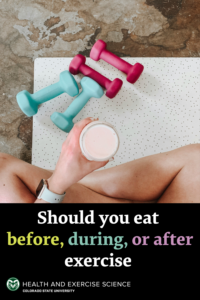 We in the Adult Fitness Program at Colorado State University often receive questions about exercise and health that revolve around the best form of exercise, the best equipment, the best food to eat, and the best time to eat. The hardest part is the frustrating answer we give: “It depends.”
We in the Adult Fitness Program at Colorado State University often receive questions about exercise and health that revolve around the best form of exercise, the best equipment, the best food to eat, and the best time to eat. The hardest part is the frustrating answer we give: “It depends.”
What’s best for one person might be different for another. When it comes to eating around exercise, there can be a few approaches. With any of these, it might take some practice before finding the right balance for you. Overall, if you’re exercising, it is important to make sure you eat well to fuel your activity. Here, we break down what it might look like to eat before, during, or after an exercise session.
Before exercise
The goal of eating before exercise is to replenish your muscle glycogen stores and make sure you have the fuel to support your activity. This could be a full meal, often a few hours before exercise, or a snack 30-60 minutes before exercise.
Whether you choose a meal or a snack, ideally your food choice contains some carbohydrates and protein. There can be some fats, but this may cause an upset stomach during exercise, so try to minimize these.
Before a workout, you should consume more carbohydrates than protein. Try to get these from whole foods, like a banana and peanut butter, versus a bar or drink. However, these convenience options can be used, and can even be helpful, at times.
Before exercising, it’s important to drink liquids for hydration-beyond consuming food only. Your pre-exercise food choice doesn’t have to be a whole meal. For people who like to exercise first thing in the morning, eating a big meal before is not realistic. At these times, eating a little snack will help to prime metabolism and, depending on the activity, will fuel you through the workout.
Eating too long before exercise could mean running out of the fuel you need, and too close can cause stomach pain and discomfort, so finding the ideal time takes some experimenting in timing and choices of food.
During Exercise
Not everyone needs to eat during a workout. The need to eat during a workout depends more on the intensity and length of the exercise session. Glycogen stores, which fuel a large portion of our exercise, are estimated to last about 90 minutes at most. So, with an activity taking close to 90 minutes or more, you might want to re-fuel closer to 45-60 minutes to make sure you don’t go empty.
If you’re exercising for less than 90 minutes, you likely won’t need to intake food. Again, this can be person-dependent, so experimenting can be helpful. The source of your re-fueling and the amount are also person- and activity-dependent. For example, some might prefer to consume water or another liquid supplementation as it’s easier to drink than eat while exercising. This is also a great way to add electrolytes and carbohydrates during your workout.
Others may prefer gels, bars, or chews that have specific formulas to better support activity. In some instances, people might prefer whole food sources that are packaged in convenient ways to eat on the go.
After Exercise
After exercise, we may be focusing more on recovery from a physical standpoint, but fueling during this time can help with recovery, improvements in fitness, and preparation for the next workout.
Like eating before and during exercise, food sources should include carbohydrates, protein, fluids, and electrolytes. Getting some carbohydrate and protein sources in the 30-90 minute window after exercise helps to replenish your glycogen stores, and aids recovery allowing for great training response in the long run. Regarding hydration, gradually rehydrating for up to 4-6 hours after exercise can help you prevent dehydration for your next session.
If you’re new to exercise or a certain program, go slow and be sure to try a variety of products and timing. Patience is essential on your journey, so give yourself the time to find out what works best for you.
Kimberly Burke is a lecturer in the Department of Health and Exercise Science and the director of their Adult Fitness Program at Colorado State University. Adult Fitness offers exercise opportunities for employees of CSU as well as community members, while providing hands-on learning experiences for students. To learn more, see the Adult Fitness Program website